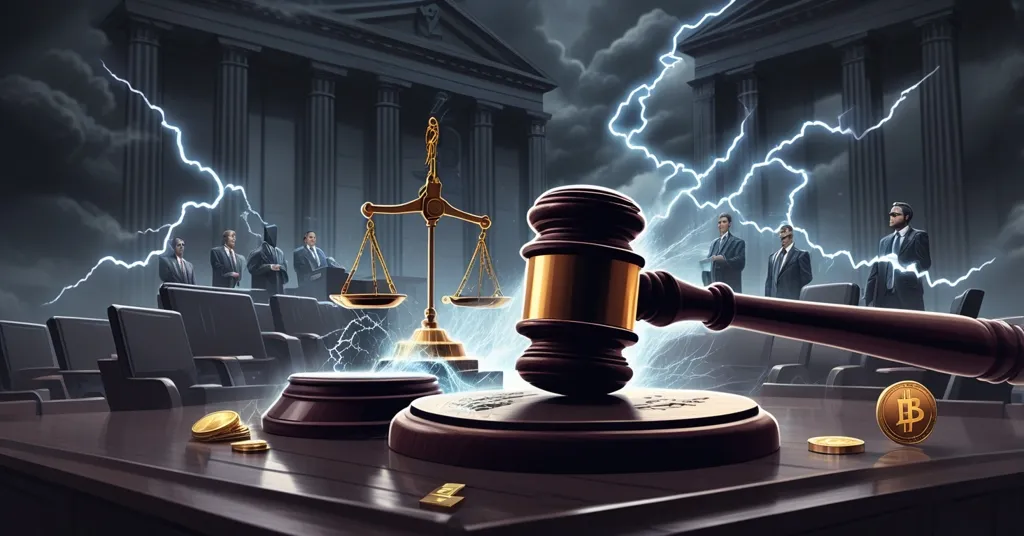Roman Storm of Tornado Cash Guilty on One Charge, Hung Jury on Others in Crypto Privacy Clash

Mixed Verdict for Tornado Cash Co-Founder Roman Storm: Guilty on One, Hung on Others in Regulatory Showdown
A high-stakes legal battle in Manhattan federal court has delivered a split decision for Roman Storm, co-founder of Tornado Cash, the Ethereum-based cryptocurrency mixing service. After four grueling days of deliberation, a US jury convicted Storm of conspiracy to operate an unlicensed money transmitting business, a charge carrying up to five years in prison. Yet, they deadlocked on the heavier accusations of conspiracy to commit money laundering and conspiracy to violate international sanctions tied to North Korean cybercrime, each of which could have meant 20 years behind bars. This mixed outcome leaves Storm—and the broader crypto privacy debate—in a precarious limbo.
- Split Decision: Guilty of unlicensed money transmission; hung jury on money laundering and sanctions evasion.
- Massive Allegations: Tornado Cash linked to over $1 billion in illicit funds, including North Korean hacker proceeds.
- Core Conflict: Privacy innovation clashes head-on with regulatory crackdowns.
Understanding Tornado Cash: Privacy Tool or Criminal Haven?
For the uninitiated, Tornado Cash is a cryptocurrency mixer built on the Ethereum blockchain. It’s a tool designed to obscure the path of digital money by pooling funds from multiple users and redistributing them to new addresses, effectively hiding who sent what to whom. Think of it as a digital laundry machine for transactions—toss in traceable crypto, and it comes out nearly impossible to track. This appeals to privacy advocates who want to shield their financial moves from surveillance, whether it’s overreaching governments or nosy corporations. But it’s also catnip for criminals aiming to wash dirty funds clean of their origins.
The US Department of Justice (DOJ) has zeroed in on this dual-use nature, accusing Tornado Cash of laundering over $1 billion in illicit proceeds since its inception. A significant chunk of this, they claim, ties back to North Korea’s Lazarus Group, a state-sponsored hacking crew infamous for massive crypto heists like the $625 million Axie Infinity exploit in 2022. Blockchain analysis has traced portions of those stolen funds through mixers, raising alarms about national security risks beyond mere financial crime, as detailed in recent reports on North Korean hacking activities.
The Legal Battle: Charges, Convictions, and Chaos
Storm, alongside co-founder Roman Semenov, faced charges filed two years ago in the Southern District of New York, marking the start of a drawn-out showdown. The DOJ’s case hinges on a brutal accusation: Storm and Semenov knowingly skipped over critical safeguards like Know Your Customer (KYC) and Anti-Money Laundering (AML) protocols. For clarity, KYC requires financial services to verify user identities, while AML mandates monitoring transactions to flag fraud or crime—standard practices in traditional banking to keep the system clean. By ditching these, prosecutors argue, Tornado Cash became a revolving door for crooks.
“Criminals who use new technology to commit age-old crimes, including hiding dirty money, undermine the public trust,” said Manhattan U.S. Attorney Jay Clayton, encapsulating the government’s hardline stance.
Prosecutor Benjamin Gianforti went further, painting Storm as driven by profit over principle:
“The real money wasn’t in protecting privacy for regular folks, it was in providing privacy for big-time crypto criminals.”
The guilty verdict on operating an unlicensed money transmitter—a business handling funds without proper registration—sticks Storm with a potential five-year sentence, to be finalized by Judge Katherine Failla at a later date. But the jury’s inability to agree on money laundering and sanctions evasion charges, despite two Allen charges from the judge urging consensus, leaves room for a retrial. Jurors even nitpicked procedural details, questioning the case’s venue and the validity of FBI evidence like cell-site analysis, hinting at the messy challenge of applying old-school financial laws to bleeding-edge tech, as explored in coverage of the verdict’s legal nuances.
The Defense: Code Isn’t Crime
Storm’s legal team, led by David Patton and Brian Klein, fought tooth and nail against the narrative of malicious intent. Patton argued that Storm never intended for Tornado Cash to become a hacker’s playground, framing it as a tool born from a belief in financial confidentiality as a basic right.
“Roman very much did not want hackers and scammers to use Tornado Cash,” Patton insisted during closing arguments.
Klein, meanwhile, expressed relief at dodging the graver charges and signaled plans to contest the guilty verdict, citing “serious legal issues” with the unlicensed transmission count. Their defense taps into a raw nerve for the crypto community: can you blame a developer for how others misuse their open-source code? It’s like suing a hammer maker because someone used their tool in a robbery—logically shaky, yet the DOJ seems hell-bent on making it stick, as discussed in a community thread on Storm’s case.
Playing Devil’s Advocate: Privacy vs. Accountability
Let’s cut through the fog with some harsh truth. On one hand, Tornado Cash embodies the cypherpunk dream—decentralization, anonymity, and a middle finger to overbearing authority. It’s the kind of tech Bitcoin’s earliest adopters salivated over, a nod to freedom in a world of surveillance. I’m all for accelerating this financial revolution (here’s to effective accelerationism), and tools like this push us toward a censorship-resistant future.
But let’s not drink our own Kool-Aid. The reality bites hard: when a mixer becomes a pipeline for laundering stolen crypto or dodging sanctions, it’s not just a philosophical debate—it’s a problem. North Korean hackers aren’t abstract bogeymen; they’ve siphoned hundreds of millions to fund regimes and weapons programs. If Tornado Cash is indeed a conduit for that, regulators have a damn good reason to swing the hammer. Ignoring this dark side is as delusional as shilling $1 million Bitcoin price predictions with zero evidence. We champion disruption, not destruction.
Still, the DOJ’s approach reeks of overreach. Holding developers personally liable for decentralized tools they can’t control after release is a witch hunt against code itself. It’s a slippery slope—if Storm’s guilty for writing software, what’s stopping prosecutors from targeting every DeFi coder or privacy coin creator? That’s not regulation; it’s strangulation of innovation, a concern echoed in analyses of regulatory impacts on privacy tools.
A Regulatory Plot Twist: Sanctions Reversed?
Here’s a curveball that muddies the waters further. In March 2025, just two months into the Trump administration, the U.S. Treasury lifted sanctions it slapped on Tornado Cash back in 2022. The reasoning? Evolving legal and technological considerations, per official statements. Is this a sign of a pro-crypto shift in policy, or just political theater? Hard to say, but it throws a wrench into the narrative of relentless regulatory hostility. Could this soften Storm’s sentencing, or influence a potential retrial on the hung charges? It’s a wildcard worth watching, as noted in recent coverage of the split verdict.
Bitcoin, Ethereum, and the Privacy Puzzle
Through a Bitcoin maximalist lens, I’ll always argue BTC is the bedrock of decentralized money—unstoppable, sovereign, and battle-tested. But let’s be real: Bitcoin’s blockchain isn’t private by default. It’s pseudonymous, meaning transactions can often be traced with enough effort. Tornado Cash and similar Ethereum-based tools, powered by smart contracts (think automated, code-driven agreements), fill a niche BTC doesn’t directly tackle—granular transactional anonymity. Ethereum’s flexibility lets it host complex privacy solutions that Bitcoin’s lean design sidesteps, and that’s not a flaw; it’s just different roles in this sprawling ecosystem.
Should Bitcoin chase full anonymity with built-in mixing or advanced privacy layers like those in Monero? Honestly, probably not—it risks painting a bigger target on its back for regulators already itching to pounce. Let altcoins and protocols like Ethereum carry that torch, diversifying the fight for financial discretion while BTC holds the fort as the ultimate store of value. It’s a messy balance, but a necessary one, with broader implications explored in discussions on privacy tools in crypto.
Historical Context: Tornado Cash’s Rocky Road
Tornado Cash didn’t emerge in a vacuum. Launched in 2019, it gained traction among Ethereum users seeking confidentiality, hailed by privacy purists as a triumph of decentralized tech. But by 2022, the U.S. Treasury sanctioned it, alleging its role in laundering funds for state-backed hackers. That move sparked outrage in the crypto sphere, with many arguing it overstepped by targeting code rather than individuals. Fast forward to Storm’s trial, and the lifted sanctions in 2025, and you’ve got a saga that mirrors the industry’s broader tug-of-war between freedom and oversight. This isn’t just a legal case; it’s a microcosm of crypto’s identity crisis, as debated in online forums on developer liability.
Ripple Effects: DeFi, Developers, and Beyond
Zooming out, Storm’s verdict could be a sledgehammer to decentralized finance (DeFi) and open-source development. If coders can be jailed for how others use their tools, who’s going to risk building the next big protocol? A seasoned developer on social platforms summed up the dread: this sets a chilling precedent, potentially scaring talent away from privacy tech or DeFi innovation altogether. Compare this to past cases like BitMEX, where executives faced charges for regulatory lapses, or Ripple’s tussle with the SEC over XRP’s status— the DOJ’s pattern of targeting crypto players is clear, and it’s not exactly a love letter to permissionless systems, a trend highlighted in reports on Storm’s conviction setting legal precedent.
Community reactions are split down the middle. Privacy hawks on X decry the conviction as state overreach, while others begrudgingly admit mixers attract bad actors. Meanwhile, the fate of Tornado Cash itself hangs in the balance—will it face operational shutdowns, community forks, or defiant persistence underground? And for Storm, a looming sentencing and possible retrial on deadlocked charges keep the pressure on.
Key Takeaways and Burning Questions
- What does this mixed verdict mean for Roman Storm and Tornado Cash?
Storm faces up to five years for the unlicensed money transmission conviction, with sentencing pending, while a hung jury on graver charges opens the door to a retrial. Tornado Cash remains in legal limbo, with operational restrictions or shutdowns a looming threat. - How does this case affect cryptocurrency privacy tools?
It cranks up the heat on mixers and anonymity-focused protocols, potentially stifling innovation or pushing them into shadowy corners, while signaling that compliance with financial laws isn’t optional. - Why are KYC and AML rules such a flashpoint for mixers?
These regulations demand transparency to curb financial crimes, directly clashing with mixers’ core function of obscuring transaction trails, making tools like Tornado Cash prime targets for law enforcement. - What’s North Korea’s role in this mess?
State-sponsored hackers like the Lazarus Group allegedly used Tornado Cash to launder massive crypto hauls, escalating this from a financial issue to a national security concern for the U.S. government. - Will this verdict haunt other crypto developers?
Damn right it might. It could set a precedent holding coders liable for third-party misuse of decentralized tools, casting a shadow over DeFi and privacy tech development with the threat of legal blowback.
This legal showdown isn’t just about Roman Storm or Tornado Cash—it’s a referendum on crypto’s soul. We’re rooting for decentralization, privacy, and shattering the status quo, but the path is littered with landmines. The fight over where to draw the line between freedom and accountability rages on, and cases like this force us to confront the ugly trade-offs. Are we building a borderless financial future, or handing bad actors a get-out-of-jail-free card? That’s the million-Bitcoin question—and no one’s got a clean answer yet.



